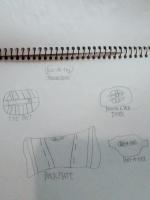How To Become An Inventor
Many people ask how to become an inventor. They may not use those exact words but people that have an idea need real information that can take them from concept to success. As with most things in life there are no real secrets. There is a lot misinformation put out by certain groups to confuse inventors. See invention scam's for things to look out for.
Everybody seems to want to offer advice to the would be inventor, much
of it bad advice. Things you might hear include: "Don't tell anyone
about your invention, they might steal it." or "Patent your idea before
someone else does." Most of the time this is bad advice.
Why?
The
harsh reality is that most ideas will not be successful. Invention is a
tough game. Also there are people in the invention community that want
to get inside of your wallet and will say anything to do so.
The other reason is that developing new products is hard. There is a lot of competition. Just take a look at the store shelves at a Target or Walmart store. There is a lot of stuff out there already. Your product must be able to compete with these items and be better in some way.
Maybe your item is lower cost. Maybe it solves a problem no other product can. Or it could be as simple as a cool new redesign of an old stand by product. The point is that for a product to be successful it must be different, it must stand out and consumers must want to risk their hard earned dollars on it. If your product does not do these things then it will be difficult to be successful.
Without these things nothing else matters. Not a patent or a fancy marketing campaign. So the first step on how to become an inventor is: create a unique and desirable product.
The second step for how to become an inventor is to believe in yourself. You can do it if you are observant and persistent. You must be observant to find the hidden opportunities that exist in the marketplace. These are the unmet needs of the consumer.
See new invention ideas for help coming up with the right product idea. Being persistent is the other side of the coin. Nothing seems to work the first time around. You have to fail to learn what does not work. Then you have to try again. Overnight success can take years but you can do it. Be persistent.
The final thing that successful inventors do is they evaluate their product ideas. This is one of the most over looked yet the most important thing you can do to be successful as an inventor. If you do just this one thing you will be far ahead of the average inventor.
Get over your fear of someone stealing your idea and start evaluating it. Talk to target customers, do market research and test your product if you can. It is very rare that someone or a company steals an idea. Take the necessary precautions with non disclosure agreements and recording your idea but do not be paranoid.
Once you have evaluated your idea and you believe, backed up with data, that you will be successful you need to learn how to patent an idea. After your idea is protected you can start to take action to make money on your product. If you don't have the money to get started you can fund your idea here.
You can become a successful inventor. Use the guidelines above and don't give up when things get difficult.
Return to Home Page from How To Become An Inventor
Recent Articles
-
Don't Dare Underwear
Jun 19, 24 11:03 AM
I created a new concept of the boxer briefs with the pocket. They are specifically designed to carry a condom. Joining the fight against infectious diseases -
Rol-A-Flex: Platinum Edition
Apr 08, 24 11:24 AM
Hi My Name Is Malcolm Washington, I'm 19 Years Old And My Invention Is A New And Important Rol-A-Flex AB Belt Called Rol-A-Flex Platinum Edition, It's -
SENSE AWARE
Mar 26, 24 08:00 AM
Sense Aware represents the latest assistive technology project designed to improve safety and independence for the disabled. At its core is the Arduino

